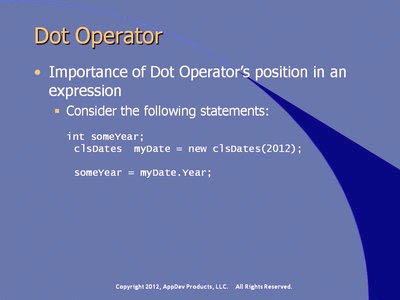Object Oriented
Programming will help you improve your programming skill set by giving
you a thorough understanding of OOP regardless of your programming
background. The training uses a non-jargon approach to teaching the
backbone concepts of OOP which have been field tested in years of
university-level teaching. While Visual Studio and C# form the
instruction environment, the course is language agnostic as possible so
the concepts are easily applied to other popular OOP languages and
platforms.
Uploaded.net
Letitbit.net
In this course, you will learn:
- The history of programming
- About Encapsulation, Inheritance and Polymorphism
- How class properties and methods are used
- About object state and property methods
- The difference between rvalues and lvalues
- How design is important to the programming task
- How to derive “IS A” classes
- What are delegates and interfaces
Table of content
Programming History
- Binary – First Generation Languages
- Assembler – Second Generation Languages
- Third Generation Languages – C
- OOP – Simula to C++
OOP
- Benefits: The OOP Trilogy
- Why C#
Introduction to Objects
- Job Interview Example
- Developing a clsPerson Class
- Class Design for Interview
- Classes, Objects and Instantiation
Properties and Methods
- Purpose of Properties
- Access Specifiers
- The clsDates Example
Thinking Like an OOP Programmer
- Define vs. Declare Difference
- The Bucket Analogy
OOP Design Guidelines
- Styles BDUF, Agile Modeling, Cohesion and Coupling
- Design Purpose
- Tools
Inheritance Example
- Details on Inheritance – Parent-Child
- Investment Example
Delegates and Interfaces
- Purpose of Each
- Benefits
Letitbit.net







No comments:
Post a Comment